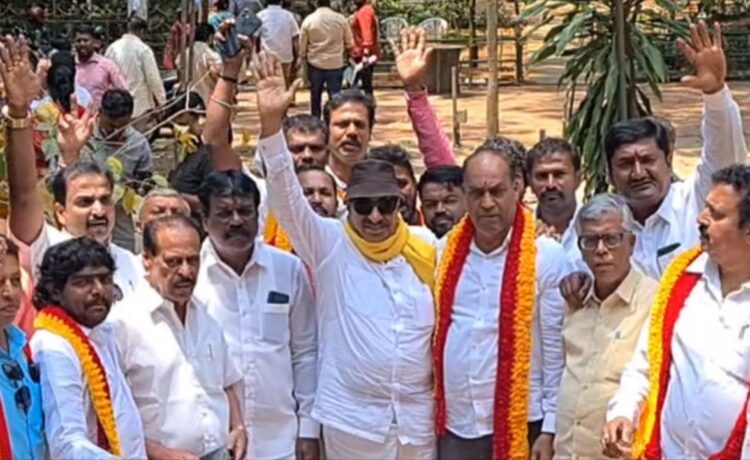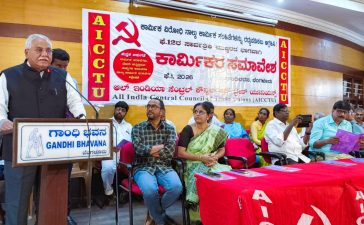Statewide Shutdown as Kannada Activists Condemn Government Apathy
Bengaluru: Karnataka came to a standstill as pro-Kannada organizations, led by Kannada Vakkoota and prominent activist Vatal Nagaraj, called for a statewide bandh to protest against the government’s alleged neglect of the state’s language, culture, and people. The bandh, supported by numerous Kannada groups, was a stark reminder of the growing discontent over unresolved issues plaguing the state.
Government Faces Backlash for Alleged Suppression
The bandh, organized to champion the cause of Kannada and Kannadigas, was met with heavy criticism of the state government. Protesters accused the administration of attempting to stifle their movement by deploying police forces to intimidate activists.
“No force can stop us from observing this bandh. This is not about elections or profits; this is a fight for the soul of Karnataka and its language,” declared Vatal Nagaraj, emphasizing that the protest was driven by a genuine concern for the state’s welfare, not political motives.
Deputy CM Slammed for Betraying Kannada Cause
The Kannada Vakkoota leaders also lashed out at Deputy Chief Minister D.K. Shivakumar for his refusal to support the bandh. Sa. Ra. Govind, a prominent leader, reminded Shivakumar of the unwavering support he received from Kannada activists during his protests for the Mekedatu project.
“When you were in opposition, we stood by you. Now, in power, you are turning your back on the very people who fought for you. This is nothing short of betrayal,” Govind stated, expressing the group’s disillusionment with the government.
Vatal Nagaraj further criticized the government’s inaction on critical issues like the Mekedatu and Mahadayi disputes. “The people elected you to fight for their rights, but you have failed them. This is why we are forced to take to the streets,” he said.
Defiant Protest March Amid Police Restrictions
Undeterred by police restrictions, the bandh organizers announced a massive protest march from Town Hall to Freedom Park, where demonstrations continued throughout the day.
“We will not be silenced. The government cannot strip us of our democratic right to protest,” Vatal Nagaraj asserted, highlighting the resolve of the pro-Kannada activists.
The leaders also condemned business organizations that expressed moral support but refused to shut down operations. They urged all commercial establishments, including restaurants and trade associations, to join the protest by closing their businesses for the day.
Key Demands of Pro-Kannada Groups
The protesters outlined a series of demands, accusing the government of failing to address critical issues. These included:
- Comprehensive development of North Karnataka and border areas.
- Strict measures to protect Belagavi and a ban on the Maharashtra Ekikaran Samiti (MES) for its alleged anti-Karnataka activities.
- Deportation of MES and Shiv Sena activists involved in violence against Kannada interests.
- Removal of Sambhaji’s statue from Karnataka.
- Punishment for those responsible for attacking a Kannada conductor.
- Opposition to the imposition of Hindi in Karnataka.
- Rollback of metro fare hikes, which they argue disproportionately affect daily commuters.
- Protection of jobs for local Kannadiga drivers, who they claim are being replaced by North Indian drivers in corporate companies.
Rising Inflation Adds Fuel to the Fire
The protest also took aim at the Congress-led government for its handling of the economy, citing rising inflation and price hikes since it assumed power. Protesters criticized the increase in bus and metro fares, calling them an unnecessary burden on the common people.
Mounting Pressure on the Government
With the bandh gaining widespread support, the Karnataka government is under increasing pressure to address the grievances of pro-Kannada groups. The protest serves as a stark reminder of the state’s simmering discontent and the urgent need for meaningful action.
“The government can no longer ignore the voices of Kannadigas. It’s time they prioritize the people over politics,” said a protester, encapsulating the sentiment of the movement.
As Karnataka grapples with these challenges, the bandh has underscored the growing rift between the government and its people, leaving the administration with no choice but to act swiftly or face further backlash.
Statements
- “The Karnataka Bandh is a wake-up call for the government to address the long-standing grievances of Kannadigas and prioritize the state’s language, culture, and people.”
- “The government’s attempt to suppress the bandh by deploying police forces is a blatant attack on democratic rights and freedom of expression.”
- “Rising inflation, metro fare hikes, and job losses for Kannadiga drivers are clear signs of the government’s failure to protect its people.”
Quotes
- “No force can stop us from observing this bandh. This is not about elections or profits; this is a fight for the soul of Karnataka and its language.” – Vatal Nagaraj, Pro-Kannada Leader
- “When you were in opposition, we stood by you. Now, in power, you are turning your back on the very people who fought for you. This is nothing short of betrayal.” – Sa. Ra. Govind, Kannada Vakkoota Leader
- “The government can no longer ignore the voices of Kannadigas. It’s time they prioritize the people over politics.” – Protester at Freedom Park
Q & A
Q: Why was the Karnataka Bandh called?
A: The bandh was called to protest against the government’s neglect of Kannada language, culture, and people, as well as issues like rising inflation, metro fare hikes, and job losses for Kannadiga drivers.
Q: What are the key demands of the protesters?
A: The demands include the development of North Karnataka, protection of Belagavi, a ban on Maharashtra Ekikaran Samiti (MES), deportation of anti-Kannada activists, removal of Sambhaji’s statue, and a rollback of metro fare hikes.
Q: How did the government respond to the bandh?
A: The government deployed police forces to suppress the protest, drawing widespread condemnation from pro-Kannada groups and activists.
Q: What is the significance of this bandh?
A: The bandh highlights the growing discontent among Kannadigas and serves as a reminder to the government to address their grievances urgently.
Context and Background
Karnataka has a rich cultural and linguistic heritage, with Kannada being the state’s official language. However, pro-Kannada groups have long accused successive governments of neglecting the state’s language, culture, and regional development. Issues like the imposition of Hindi, rising inflation, and job losses for locals have further fueled discontent. The Karnataka Bandh, led by Kannada Vakkoota and supported by various organizations, is a culmination of these frustrations, demanding immediate action from the government.
#KarnatakaBandh #ProKannada #KannadaRights #GovernmentApathy #SaveKarnataka #InflationHike #DemocraticProtest #KannadigaVoices
![]()











